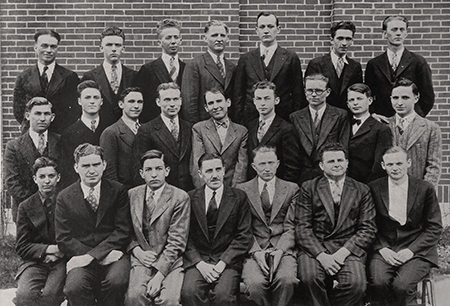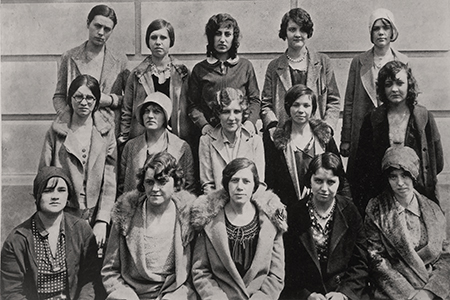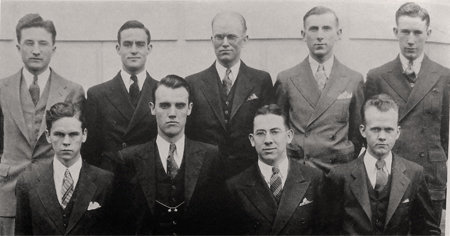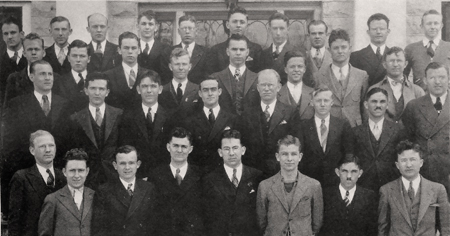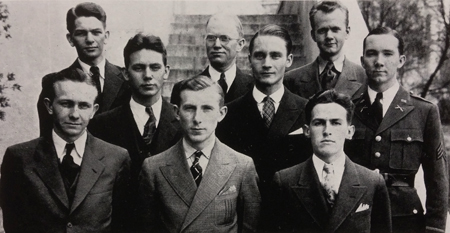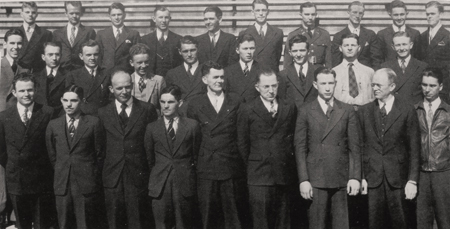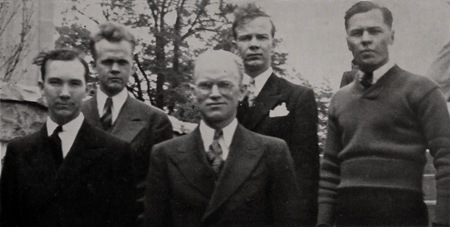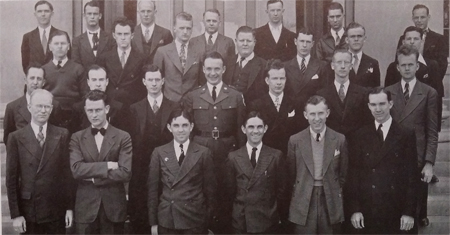< Back to Historical Archives main page
Summary of 1930 through 1939
The rise of James Reid Sterrett
Oratorical competition returns in our records in 1934. A year later James Reid Sterrett, coordinator of theatrical productions and speech teacher, began his remarkable streak of oratory state champions and national competitors. Another year brought James P. Cornette to sponsor the Congress Debating Club, and this shake-up may explain the sudden resurgence of intercollegiate debate. Western again competed with other schools regularly in both oratory and debate, and even began occasionally hosting collegiate and high school speech and debate tournaments.
As found in the previous decades, the nature of debate competition was for a small group of students to represent their school and debate one other school's team in a match. In this decade, however, Western sent representatives to multiple contests--often on a multi-week trip--to multiple schools. This also brought Western to build not a single group of three, but more of a team which would split into twos. It appears that the team would split into a small group of affirmative debaters and another of negative debaters, and they would consistently represented that side on a single topic throughout the school year, provided by Pi Kappa Delta. Interested parties should note how the 1937 transcript shows the negative speaking first, whereas debate formats of 2016 all require an affirmative speak first.
Virtual disappearance of women
Exactly what caused the disappearance of women from competitive debate and oratory at Western for most of this decade--and the next--is not clear. A few ideas, however, can be explored. First, there was social change, whereby new national social forces of the early 1930s strongly shaped gender performance expectations. The 1930 yearbook entry accompanying the Girls Debating Club reassured readers that the women did not debate; they only "discussed" issues.1 The year before featured women debating whether trials by jury should be abolished, so a sudden and drastic social counter-revolution seems a weak explanation. Beyond social explanations, there was of course money. The Great Depression may have necessitated the dissolution of some campus groups, of which the GDC may have been one of the chosen sacrifices, except that the dates don't line up adequately. The GDC was dissolved more than a year before the Depression appears to have impacted the school's funds and student body, which was most seriously marked in 1932-33. In fact, the school's population and moneys had reached its peak the year *after* the GDC ended. Interestingly, while the school's enrollment declined radically over this decade, the proportion of women at Western actually increased. Between the height of the Depression and the middle of the US involvement in the Second World War, enrollment declined from fourth thousand two hundred and fifty-three in 1930-31 to nine hundred and thirty-eight in 1943-44.2 While women comprised fifty-three percent of the student body in 1940 (unusually low for a Normal School) by the winter quarter of 1944 seventy-six point four percent were women. A top-down opposition to women engaged in this kind of activity may, however, also merely be a red herring. This brings us to the second possible explanation for the change.
The fact is that there were many new activities on campus to draw a woman's interest (or anyone's) namely sports. A large new athletic building--now the Margie Helm Library--was finished in 1931, and it ushered in a major increase in new sports activities, including intramural sports. Of course, sports were not alone, and the development of a new intramural theatrical contest clarifies the breadth of new options available to students. An increase in extra-curricular options had, after all, reduced debate and oratorical activities at Ogden College only a few years earlier, so the explanation has precedence.
Whichever path best explains the near absence of women in debate and oratory in this decade, however, we are still left with the greater question of why this remained the case for nearly two decades, through the 1940s as well. While women did return to competitive oratory and debate in 1936, this presaged nothing as the 1940s appears totally devoid of women in these archives. That question remains unanswered.
Annual Subsections: 1930 - 1939
1929-30
Forensics
Franklin Pierce Hayes, CDC member, placed second in the Regional Oratory contest in Knoxville, Tennessee some time in mid-April 1930.4 Not part of a team, he traveled alone. A copy of what appears to have been his speech can be found in the above note citation.
Intercollegiate debate for both men and women was cancelled for the 1929-30 school year. The Girls Debating Club was also dissolved after the below photo was taken. The recent stock market crash may be a tempting culprit, but its impact on Western took a few more years. A February 1930 College Heights Herald article may offer the solution when it noted that someone might next year be hired to coach oratory and debate, suggesting that the cause was a personnel problem.3
Campus oratory
Ogden: Lawrence Cleo Roberts; Robinson: Delbert Earl Wagoner
Congress Debating Club
L.Y. Lancaster (sponsor), Officers: elected every five weeks G. Robert Boyd, R.E. Centers, Albert Gordon Crume, F.E. Elliott, Cecil Fulkerson, Roy L. Graff, Carroll C. Hart, Franklin Pierce Hayes, Evon Howell, Frederick E. Maples, Harold Mount, Charles B. Neville, Rudell Nunn, J.B. Pitman, Regie Peyton, C.H. Redman, Albert Goodwin Thompson, Orba Traylor, F.L. Turner, Haskell H. Vincent, Ralph Whalin, Marvin Whipple, Durward B. Williams, Lester Woosley, Louis Yandell |
Girls Debating Club
Mrs. Mary E. Barnhill (sponsor), Irma Lawrence (pres), Pansy Wilcoxson (vp), Hazel G. Adams (sec), Maralea Arnett (business mgr) Mary Abdoo, Helen Brink, Nova Ellis, Myrtle Goff, Pansy Henderson, Henrietta Holland, Blanche Logan, Ella Mae McQuary, Edmonia Rone, Hazel Scott, Mary Simpson, Louise Welch |
1930-31
Congress Debating ClubClub Sponsor: Prof. W.M. Willey G. Robert Boyd, Clifton Cook, Orion Covington, James L. Duncan, Herbert L. Foster, Roy L. Graff, Orville A. Hamilton, Charlie Francis Holt, William David McElroy Jr, David H. McEuen Jr, Charles B. Neville, E.L. Ockerman, John L. Peters, Harry Roberts, William Neil Taylor, Albert Goodwin Thompson, Sheppard Walker, George W. Waller, Marvin R. Whipple, F.D. Wilkinson, Joseph B. Williams, Willson E. Wood, C.R. Yates |
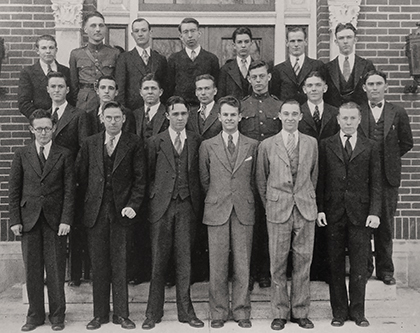 |
Campus oratory
Ogden: Herbert Foster; Robinson: Joseph R. Lafferty
1931-32
Congress Debating ClubSponsor: Dr. L.Y. Lancaster Eddie W. Belcher, Mosley Cambron, Hubert W. Comer, M.M. Cox, R.C. Gibson, D.B. Hawkins, Charlie Francis Holt, Evon Howell, M.A. Jones, J.Q. Kirby, James O. Lawrence, F.M. Lester, Charles B. Neville, Rudell Nunn, F.L. Pearl, O.G. Pennington, Cecil M. Preston, Ray Russell, Robert Lee Sanders, Hubert Snider, Neil Taylor, John B. Thomas Jr., James Walker, Sheppard Walker, Marven R. Whipple, Emery H. White, Joseph B. Williams, Sidney L. Wyatt, C.R. Yates
Campus oratoryOgden: E. Kelly Thompson; Robinson: W. Hayes Wiggins |
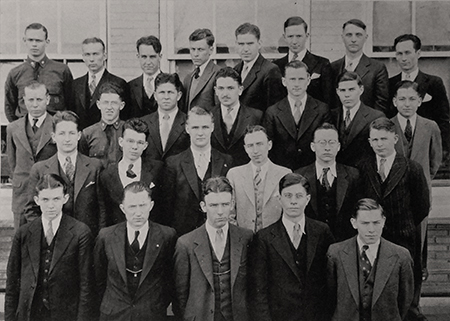 |
1932-33
Congress Debating Club
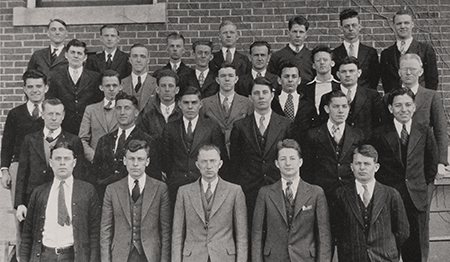 Sponsor: Dr. L.Y. Lancaster R.M. Allen, R.F. Butler, Hubert W. Comer, Orin Covington,
Charles Crume, R.C. Carpenter, John Clayton, Paul Cochran, Ezra L. Davis, Roma A.
DeMunbrun, A.R. Dye, Freddie E. Elliott, Marvin Glass, Osville Glass, Nolan W. Hunter,
I.D. Henson, Lewis H. Jull, Roy Kelley, John D. Lecky, Ray Logan, Clarence Miller,
R.F. Moore, John Muir, Collins F. Moseley, Rudell Nunn, O.G. Pennington, H.L. Pritchard,
Hoyt Parsley, Cecil M. Preston, F.L. Pearl, Quinn Pearl, Merryl Runner, A.O. Richards,
Ezra J. Short, William Neil Taylor, John B. Thomas Jr., James Walker, Emery H. White,
G. Waller, Joseph B. Williams, C.R. Yates
Sponsor: Dr. L.Y. Lancaster R.M. Allen, R.F. Butler, Hubert W. Comer, Orin Covington,
Charles Crume, R.C. Carpenter, John Clayton, Paul Cochran, Ezra L. Davis, Roma A.
DeMunbrun, A.R. Dye, Freddie E. Elliott, Marvin Glass, Osville Glass, Nolan W. Hunter,
I.D. Henson, Lewis H. Jull, Roy Kelley, John D. Lecky, Ray Logan, Clarence Miller,
R.F. Moore, John Muir, Collins F. Moseley, Rudell Nunn, O.G. Pennington, H.L. Pritchard,
Hoyt Parsley, Cecil M. Preston, F.L. Pearl, Quinn Pearl, Merryl Runner, A.O. Richards,
Ezra J. Short, William Neil Taylor, John B. Thomas Jr., James Walker, Emery H. White,
G. Waller, Joseph B. Williams, C.R. Yates
Campus oratory
Ogden: Roma A. DeMunbrun; Robinson: Hoyt Parsley
1933-34
Oratory
E. Kelly Thompson--still taking classes--won a KEA state oratorical tournament in Lexington, in January.5 This was not the KIOA tournament, at which Western only began to compete in 1935.
Later in the year the Pi Kappa Delta national tournament was held in Lexington, but neither of two sources mention Western or BGBU sending any representatives.6 For those interested in the nature of collegiate speech and debate competition at the time, the article notes competition in extemporaneous speaking, oratory, and debate.
Campus oratory
Ogden: Delbert Earl Wagoner; Robinson: Norris Brooke Vincent
Congress Debating ClubSponsor: Dr. L.Y. Lancaster Oliver Curtis Allcock, Otis Allen, Henry Baker, Wendell Butler, Hubert W. Comer, I.H. Cox, Ray Dye, C.O. Evans, Robert Fields, Marvin Glass, Osville Glass, Raymond Yarbrough Hooks, Paul Huddleston, Roy Kelley, Garland Kemper, John W. Koon, Sherrill Leach, James B. McEuen, James McNeely, Clarence Miller, Russell Miller, R.F. Moore, Collis F. Mosely, Rudell Nunn, Elvin Osborne, Francis Pearl, Quinn Pearl, Glenn Pennington, A.O. Richards, Luke Roberts, Ezra J. Short, John B. Thomas Jr., James Walker, Joe Ward, Eugene R. Webb, Robert Weldy, Thomas Withers |
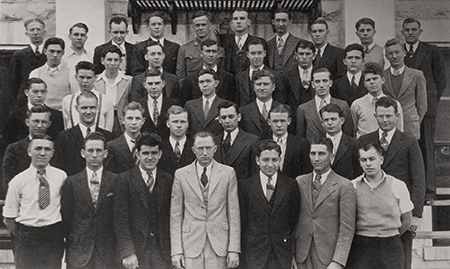 |
1934-35
Oratory
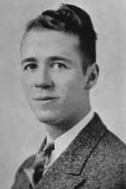 Sam Milner won the Kentucky Inter-Collegiate Oratorical Association tournament on 2 March, at
Morehead Teacher's College, after winning an intra-campus contest to represent the
school.7 The KIOA began in 1888. This qualified Milner for the Interstate Oratorical Association
contest, in Evanston, Ill, where he placed fifth in the nation. Theater director J.
Reid Sterrett, Jr. was listed as Milner's coach. The source claims Western had just
joined the state league that year, suggesting that E. Kelly Thompson's contest the
previous year may have been a different tournament. Its also worth nothing that this
was not a long-term team of students competing for multiple years. All of Western's
oratorical contestants from this period vied for a chance at the state tournament
only once, suggesting to this author that these students were from Sterrett's speech
class.
Sam Milner won the Kentucky Inter-Collegiate Oratorical Association tournament on 2 March, at
Morehead Teacher's College, after winning an intra-campus contest to represent the
school.7 The KIOA began in 1888. This qualified Milner for the Interstate Oratorical Association
contest, in Evanston, Ill, where he placed fifth in the nation. Theater director J.
Reid Sterrett, Jr. was listed as Milner's coach. The source claims Western had just
joined the state league that year, suggesting that E. Kelly Thompson's contest the
previous year may have been a different tournament. Its also worth nothing that this
was not a long-term team of students competing for multiple years. All of Western's
oratorical contestants from this period vied for a chance at the state tournament
only once, suggesting to this author that these students were from Sterrett's speech
class.
[Link to 1935 Results Archive]
Campus oratory
Ogden: Norris Brooks Vincent; Robinson: Albert W. Mitchell
Congress Debating ClubSponsor: Dr. L.Y. Lancaster Jack Alexander, Neil Baxter, Kelly Bennett, William Bryant, Wendell Butler, Joseph C. Cantrell Jr., Walter Chestnut, A.R. Dye, Robert Field, Paul Huddleston, William Juett, John Juett, Milton Jones, Roy Kelly, Charles L. Lawhorn, John D. Lecky, Homer E. Losey, John Lovett, James McGoodwin, Paul McLemore, Rollie Moore, Elvin Osborne, Francis Pearl, Glenn Pennington, Ray Quiggins, Frank Rohrer, Charles Runyon, Elbert Taggart, Norris Vincent, James Walker, David Walden, Joe Ward, Thomas Withers, Stoy G. Witten, R.P. Woodward |
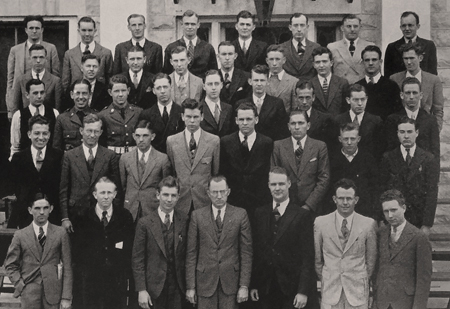 |
1935-36
Debating Squad
Coach: James P. Cornette; Kelley Bennett, Ray Logan, Paul R. Huddleston, Joseph C. Cantrell Jr., Bemis Lawrence, John Lovett, Coy H. Parsley, John D. Welch The newly-formed 1936 debate team was the first since 1929, and it was composed primarily of Congress Debating Club members. Using a topic supplied by Pi Kappa Delta, they debated Kalamazoo College, Greenville College, Franklin College, Indiana State Teachers College, Illinois State Normal, Oakland City College, Asbury College (by radio broadcast), Austin-Peay Normal, Berea College, the University of Kentucky, Georgetown College, Transylvania College, and Eastern Kentucky Teachers College.8 Much of these meets took place by traveling between several schools in a single weekend. The April radio debate with Asbury College made use of Western's new radio broadcast. Some other schools had been debating via radio for several years. On 19 March 1936, both men and women debated Berea College.9 Unfortunately, no known source references the women who debated, calling into question the accuracy of the reference in Berea's yearbook. Otherwise, it would be the only known example of women competing in debate at Western between 1929 and 1951. |
Congress Debating Club
Sponsor: James P. Cornette Fred Allcock, Otis W. Allen, Paul Allen, Jack Alexander, Neil Baxter, Kelley Bennett, E.R. Bradley, William Bryant, Wendell Butler, Joseph C. Cantrell, Clifton Cook, Charles Crum, Paul Davis, Kenneth Emberton, Thomas Fike, Merriel Harris, Damon Harrison, Jack Heathe, Richard Hopkins, Paul R. Huddleston, Bill Jouette, Garland W. Kemper, Nicholas Knight, John D. Lecky, Ray Logan, Homer E. Losey, John C. Lovett, Collis Moseley, Coy Parsley, Charles Runyon, Norris Brooks Vincent, Hubert E. Wagoner, Joe Ward, John D. Welch, August Winkenhofer, R.P. Woodward |
Oratory
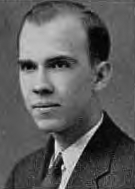 For the second year in a row Western won the Kentucky Inter-Collegiate Oratorical
Association tournament on 7 March, which was hosted on Western's campus for the first
time.10C. Harvey Gardiner then competed but did not place at the Interstate Oratorical Association tournament,
in Evanston, Ill. In order to represent Western at the state tournament, as Milner
before, Gardiner had to win a campus tournament first. Interestingly, there does appear
to have been a separate division for women in Kentucky and the inter-state tournament,
but Berea College sent the only student from Kentucky. Berea's team was much more
developed than was Western's, and had included women far longer and far more extensively.
[Link to 1936 Results Archive]
For the second year in a row Western won the Kentucky Inter-Collegiate Oratorical
Association tournament on 7 March, which was hosted on Western's campus for the first
time.10C. Harvey Gardiner then competed but did not place at the Interstate Oratorical Association tournament,
in Evanston, Ill. In order to represent Western at the state tournament, as Milner
before, Gardiner had to win a campus tournament first. Interestingly, there does appear
to have been a separate division for women in Kentucky and the inter-state tournament,
but Berea College sent the only student from Kentucky. Berea's team was much more
developed than was Western's, and had included women far longer and far more extensively.
[Link to 1936 Results Archive]
Campus oratory
Ogden: Nicholas Knight; Robinson: Joseph C. Cantrell, Jr.
1936-37
Debate Squad
Sponsor: Louis B. Salomon Joseph C. Cantrell, Gordon Edwards, B.H. Henard, Ray Logan, Warren Miller, Charles Runyan, Elbert Taggart, John D. Welch, August Winkenhofer On 18 January 1937 Western hosted and lost two debates against Union University, of Jackson, TN, each having fielded both affirmative and negative teams. On 12 February, Western sent Winkenhofer and Logan to Union University to debate again, and lost there as well. On 25 February, Western planned to debate at Murray State University, but we're missing Vol XIII, No 10 of the school newspaper. On 16 March, Charles Runyard and B.H. Henon debated Illinois College at Western, but no mention was made of a winner.11 On 13 April 1937 Western debated Asbury via radio, and a transcript of the negative (Western) can be found at the below URL. Debate coach Louis P. Salomon chaired, and Henard and Runyan debated for Western. http://digitalcommons.wku.edu/dlsc_ua_records/4277 This was the second consecutive year of this radio debate. Additional articles for debate competition can be found in the following citations.12 |
Congress Debating Club
Sponsor: James P. Cornette Acting Sponsor: Dr. L.Y. Lancaster Otis W. Allen, Leslie W. Blakey, Charles Bryant, W.W. Bogie, Joseph C. Cantrell, J.C. Cook, W.E. Cooley, Paul Davis, Edward Ferrell, Richard Hopkins, Paul Huddleston, Damon Harrison, John Juett, William Juett, Nicholas Knight, Merle Laymon, Jack Langford, John D. Lecky, J. Hence Lecky, Homer E. Losey, Ray Logan, John C. Lovett, Thomas Omer, Herbert Quinn, James Reithel, Bert Rountree, Charles Runyan, Elbert Taggart, Joe W. Troutman, Joe E. Ward, August Winkenhofer Jr., J.D. Welch, R.P. Woodward Coach James P. Cornette took leave to pursue his doctorate, thus L.Y. Lancaster returned to sponsor the CDC. |
Oratory
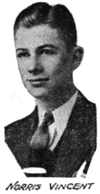
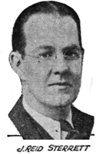 Norris Brooks Vincent won Western its third consecutive Kentucky Inter-Collegiate Oratorical Association
tournament in the first week of March, and then advanced to the semifinal round of
the Interstate Oratorical Association contest in Evanston, Illinois in late April.13 As had his two predecessors, Vincent had won a campus oratorical contest in order
to represent Western at the state tournament.
Norris Brooks Vincent won Western its third consecutive Kentucky Inter-Collegiate Oratorical Association
tournament in the first week of March, and then advanced to the semifinal round of
the Interstate Oratorical Association contest in Evanston, Illinois in late April.13 As had his two predecessors, Vincent had won a campus oratorical contest in order
to represent Western at the state tournament.
Receiving honorable mention in the women's division of the KIOA was Dorine Hawke, the first woman to represent Western in that state tournament.13
[Link to 1937 Results Archive]
Campus oratory
Ogden: Joseph C. Cantrell, Jr.; Robinson: Warren B. Miller
1937-38
CDC Debate Squad
Elbert Taggart, John Welch, Ray Logan, Alvin Trigg, Homer E. Losey Both James P. Cornette and Louis B. Salomon had taken leaves of absence at the start of the school year, leaving student Alvin Trigg to take over as scheduler of competition. The team was less active this year. Records of some of the competitions can be found at the appended citations.1415 |
Congress Debating Club
Interim sponsor: James H. Poteet; J. Clifton Cook (pres), E.R. Bradley (vp), W.E. Cooley (sec) W.D. Bratcher, Rhodes Bratcher, Joseph C. Cantrell, Everett Hancock, John Juett, William Juett, Nicholas Knight, Birney Layson, J.H. Lecky, Ray Logan, Homer E. Losey, J. Lester McGee, Thomas Omer, Herbert Quinn, Ira Ray, Joe Robertson, Bert Roundtree Jr., Tom Sawyer, Clarence N. Spencer, Elbert Taggart, Alvin Trigg, Bill Walden, John Welch |
Oratory
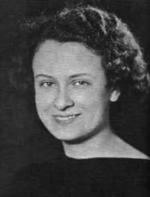 1938 was a monumental year for women in competitive speech and debate at Western,
as Catherine Cannon--pictured left--won the women's Kentucky Inter-Collegiate Oratorical Association
state championship on 5 March 1938, in Lexington.14 Gordon Edwards placed third in the men's division of the state tournament. Cannon
went on to represent Kentucky at the Interstate Oratorical Association contest in
Evanston, Ill, and finished as a semifinalist.16 She became Western's default representative in the women's division when her competition
failed to show at the campus qualifier. It is worth noting that it was Cannon--and
Leona Van Dusen, who ultimately did not compete--who requested the opportunity to
compete.
1938 was a monumental year for women in competitive speech and debate at Western,
as Catherine Cannon--pictured left--won the women's Kentucky Inter-Collegiate Oratorical Association
state championship on 5 March 1938, in Lexington.14 Gordon Edwards placed third in the men's division of the state tournament. Cannon
went on to represent Kentucky at the Interstate Oratorical Association contest in
Evanston, Ill, and finished as a semifinalist.16 She became Western's default representative in the women's division when her competition
failed to show at the campus qualifier. It is worth noting that it was Cannon--and
Leona Van Dusen, who ultimately did not compete--who requested the opportunity to
compete.
A note on Western's outreach in forensics: College High (the model school) hosted a high school forensic tournament that included the following events: debate, oratory, declamation, humorous readings, discussion, extemporaneous speaking, poetry reading, piano solo, vocal solo, trio, and quartet.15
[Link to 1938 Results Archive]
Campus oratory
Ogden: Peter Trimton; Robinson: Zack Hill
1938-39
Forensics
Western does not appear to have competed in debate in 1939, and there is no known record of Western competing in debate again until 1951. A cryptic 10 February 1939 College Heights Herald article noted oratory and dramatics coach Sterrett and student Zach Hill judging a speech contest at Bowling Green Business University "for the purpose of selecting a representative debate team."17 The result of that contest is unknown, as is the precise intent.
Zach Hill, after a close tie-breaker, placed second at the Kentucky Inter-Collegiate Oratorical Association at Georgetown College.18 Coach Sterrett opted against hosting a state qualifier tournament for women in 1939, presumably because of the dearth of interest the previous year.
[Link to 1939 Results Archive]
Campus oratory
Ogden: Homer E. Losey; Robinson: Paul F. Rutledge
Congress Debating Club
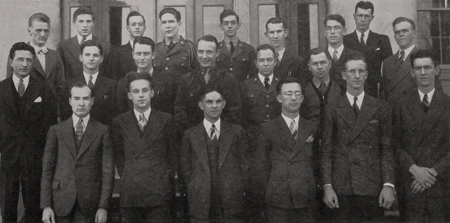 Sponsor: Dr. James P. Cornette
Sponsor: Dr. James P. Cornette
(front l-to-r) E.R. Bradley, Lester Spalding, William Juett, Clarence Wofford Duggins, W.E. "Goo" Cooley, Belmont Forsythe
(middle l-r) Dr. J.P. Cornette (sponsor), B.T. Rountree Jr., W.D. Bratcher, Joe M. Robertson, Charles Van Meter Wesley, Homer E. Losey
(back l-r) E.B. Sawyer, Richard Oexmann, Roger Thomas, Albert Christian, John Searcy, James Frederick, E.F. Ferrell, Ira Ray, J.H. Lecky
(not present) A.W. Mitchell, George Lacey, Sam Steger, Vernon Lee, John Edward Brown
- This did not stop Western from creating a Girls' Hockey Team. The apparent inconsistency may be explained by considering physical exercise a universal good for women and men. Additionally, Western's new--and very large--physical education building appears to have fostered a growth in physical education on campus.
- Harrison, Lowell. Western Kentucky University. Lexington: University Press of Kentucky: 1987, 113-14.
- WKU Student Affairs, "UA12/2/1 College Heights Herald, Vol. VI, No. 5" (1930). WKU Archives Records. Paper 2273. http://digitalcommons.wku.edu/dlsc_ua_records/2273
- The winner of this contest, from Tennessee, qualified for the Zone contest. All of the oratorical contests in these archives prior to 1935 appear to be one-off affairs; "Franklin Hayes is Second in Contest of Orators, Report." The Park City Daily News. 26 April 1930, page 4. Library Special Collections, Western Kentucky University.; WKU Student Affairs, "UA12/2/1 College Heights Herald, Vol. VI, No. 8" (1930). WKU Archives Records. Paper 2276. http://digitalcommons.wku.edu/dlsc_ua_records/2276; Likely copy of his speech: http://digitalcommons.wku.edu/stu_org/73
- Though the tournament was described in much the same manner as the KIOA in later years (e.g.: location, prize, and other contestants) later articles recalling Western's history of success at the KIOA never once recall Thompson's win at this KEA contest. Additionally, while the KEA tournament was gender-integrated, the KIOA had separate divisions; WKU Student Affairs, "UA12/2/1 College Heights Herald, Vol. X, No. 8" (1934). WKU Archives Records. Paper 3712. http://digitalcommons.wku.edu/dlsc_ua_records/3712
- News Publishing Company, "UA1A Students Weekly" (1934). WKU Archives Records. Paper 254. http://digitalcommons.wku.edu/dlsc_ua_records/254
- WKU Student Affairs, "UA12/2/1 College Heights Herald, Vol. X, No. 11" (1935). WKU Archives Records. Paper 3763. http://digitalcommons.wku.edu/dlsc_ua_records/3763
- WKU Student Affairs, "UA12/2/1 College Heights Herald, Vol. XII, No. 12" (1936). WKU Archives Records. Paper 3755. http://digitalcommons.wku.edu/dlsc_ua_records/3755
- There is also no record of the debate in The Park City Daily News from 12 through 25 March, though there is one 23 March article detailing the return of the regular debate team; Chimes, 1936. Berea College: Berea, KY (1936), 69. URL: https://archive.org/details/chimes193600bere
- Dr. H.H. Cherry's address at that contest indicated that the event was sponsored by the Louisville Courier Journal: Cherry, Henry, "UA3/1/4 Henry Cherry Speeches Vol. 5, Part 2" (1936). WKU Archives Records. Paper 511. http://digitalcommons.wku.edu/dlsc_ua_records/511; News Publishing Company, "UA1A Students Weekly" (1936). WKU Archives Records. Paper 196. http://digitalcommons.wku.edu/dlsc_ua_records/196; News Publishing Company, "UA1A Students Weekly" (1936). WKU Archives Records. Paper 203. http://digitalcommons.wku.edu/dlsc_ua_records/203
- WKU Student Affairs, "UA12/2/1 College Heights Herald, Vol. XIII, No. 7" (1937). WKU Archives Records. Paper 3767. http://digitalcommons.wku.edu/dlsc_ua_records/3767; WKU Student Affairs, "UA12/2/1 College Heights Herald, Vol. XIII, No. 9" (1937). WKU Archives Records. Paper 3765. http://digitalcommons.wku.edu/dlsc_ua_records/3765; WKU Student Affairs, "UA12/2/1 College Heights Herald, Vol. XIII, No. 12" (1937). WKU Archives Records. Paper 3773. http://digitalcommons.wku.edu/dlsc_ua_records/3773
- News Publishing Company, "UA1A Students Weekly" (1937). WKU Archives Records. Paper 215. http://digitalcommons.wku.edu/dlsc_ua_records/215; WKU Student Affairs, "UA12/2/1 College Heights Herald, Vol. XIII, No. 12" (1937). WKU Archives Records. Paper 3773. http://digitalcommons.wku.edu/dlsc_ua_records/3773
- WKU Student Affairs, "UA12/2/1 College Heights Herald, Vol. XIII, No. 15" (1937). WKU Archives Records. Paper 3770. http://digitalcommons.wku.edu/dlsc_ua_records/3770; "Fourth Western Orator Wins in College Contest." The Park City Daily News. 8 March 1937. Page 1. Library Special Collections, Western Kentucky University.
- News Publishing Company, "UA1A Students Weekly" (1938). WKU Archives Records. Paper 230. http://digitalcommons.wku.edu/dlsc_ua_records/230; News Publishing Company, "UA1A Students Weekly" (1938). WKU Archives Records. Paper 231. http://digitalcommons.wku.edu/dlsc_ua_records/231; News Publishing Company, "UA1A Students Weekly" (1938). WKU Archives Records. Paper 233. http://digitalcommons.wku.edu/dlsc_ua_records/233
- News Publishing Company, "UA1A Students Weekly" (1938). WKU Archives Records. Paper 232. http://digitalcommons.wku.edu/dlsc_ua_records/232
- The article notes she had finished the semifinal round, but awaited postings for the final round for the next day. The lack of a follow-up article on her suggests she did not advance further. WKU Student Affairs, "UA12/2/1 College Heights Herald, Vol. XIV, No. 9" (1938). WKU Archives Records. Paper 3787. http://digitalcommons.wku.edu/dlsc_ua_records/3787; WKU Student Affairs, "UA12/2/1 College Heights Herald, Vol. XIV, No. 8" (1938). WKU Archives Records.. Paper 3788. http://digitalcommons.wku.edu/dlsc_ua_records/3788
- WKU Student Affairs, "UA12/2/1 College Heights Herald, Vol. XV, No. 7" (1939). WKU Archives Records. Paper 3809. http://digitalcommons.wku.edu/dlsc_ua_records/3809; WKU Student Affairs, "UA12/2/1 College Heights Herald, Vol. XV, No. 9" (1939). WKU Archives Records. Paper 3807. http://digitalcommons.wku.edu/dlsc_ua_records/3807
- WKU Student Affairs, "UA12/2/1 College Heights Herald, Vol. XV, No. 11" (1939). WKU Archives Records. Paper 3805. http://digitalcommons.wku.edu/dlsc_ua_records/3805
< Back to Historical Archives main page
Some of the links on this page may require additional software to view.


